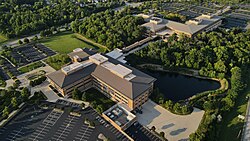Acquisitions
In 1995, Medicine Shoppe International, the country's largest franchiser of retail pharmacies, was acquired. [5] The merger represented the first non-distribution acquisition by Cardinal Health. [5]
In 1996, Cardinal Health acquired Pyxis Corporation, a company that developed automated pill dispensers for hospitals, for $867 million. [24]
In 1997, Cardinal Health planned to purchase Bergen Brunswig Corp., to which McKesson Corporation responded with a bid to purchase Amerisource. [25] Instead, Amerisource and Bergen merged into AmerisourceBergen. [25] Later that year, Cardinal Health completed the acquisition of Owen Healthcare, the second-largest provider of pharmacy management services in the U.S. at the time. [26]
In 1999, the firm acquired the Chicago-based medical products manufacturer and distributor, Allegiance Healthcare (formerly a division of Baxter Healthcare). [5] In 2001, the company acquired Bindley Western Industries, a wholesale distributor of pharmaceuticals based in Indianapolis. [27]
In April 2006, Cardinal Health purchased Niagara Falls-based ParMed Pharmaceuticals for $40.1 million. [28] In June 2007, the firm announced the completion of a tender offer for VIASYS Healthcare. [29]
In June 2010, Cardinal Health announced plans to purchase Healthcare Solutions Holding, a specialty pharmaceutical services company, for $517 million. [30] In December 2010, the company acquired Kinray, an independent pharmaceutical wholesaler, increasing Cardinal Health's presence in the independent pharmacy market by 40 percent. [31] From 2010 to 2014, Cardinal Health acquired 18 companies including Yong Yu, a Chinese drug distributor. [32] Cardinal sold Yong Yu in 2017 to Shanghai Pharmaceuticals Holding Co. Ltd. for $1.2 billion. [33]
On March 18, 2013, Cardinal Health acquired the Twinsburg, Ohio-based privately held medical supply distributor AssuraMed, and with it its subsidiaries including Edgepark Medical Supplies, for $2.7 billion. AssuraMed was backed by private equity firms Clayton, Dubilier & Rice and Goldman Sachs Alternatives. [34] [35]
In July 2014, Cardinal Health and CVS formed Red Oak Sourcing, the largest generic drug sourcing operation in the United States. [3] [36] The companies started buying generic drugs around the world to sell in U.S. markets. [3]
In March 2015, Cardinal Health signed an agreement to acquire Johnson & Johnson's Cordis (medical) division, a cardiology and endovascular device manufacturer, for $1.94 billion. [37] [38] The acquisition was completed on October 4, 2015. [39] Cardinal sold the division in August 2021 to Hellman & Friedman, a private equity firm, for $1 billion. [40]
In April 2017, Cardinal Health announced the plan to acquire the patient product portfolio from Medtronic for $6.1 billion. [41] [42] The acquisition was completed on July 30, 2017. [42]
In November 2024, Cardinal Health announced the plan to acquire Advanced Diabetes Supply Group (ADSG), a leading national direct-to-patient provider of diabetes medical supplies, for about $1.1 billion with plans to merge the company into its at-Home Solutions business. [43] [44] The at-Home Solutions business includes Edgepark Medical Supplies of Twinsburg, Ohio and United States Medical Supply (US MED) of Doral, Florida. The acquisition was complete by April 2024. [45]
In August 2025, Cardinal Health announced that it would acquire a 75% stake in Solaris Health, the largest urology management services organization (MSO) in the United States, for $1.9 billion in cash. [46]

